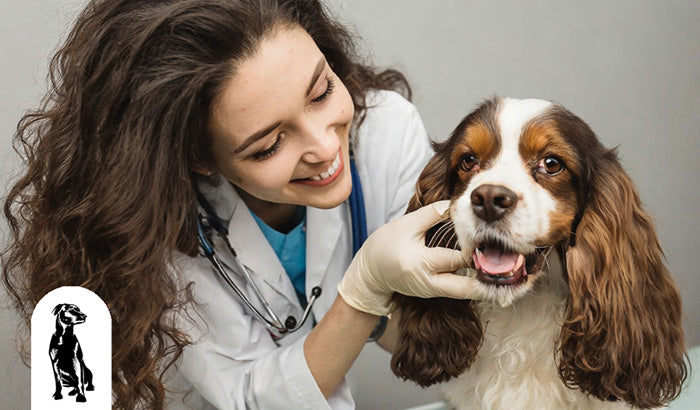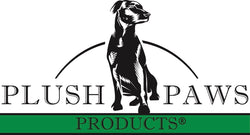
As a dog owner, you may wonder if keeping your dog’s teeth clean and healthy is actually important. Just as a pearly white grin lights up a human face, a clean set of chompers and fresh breath is vital for the well-being of your canine friend. Dental health is as critical for them as it is for us.
In the wild, gnawing on bones and natural chewing habits keep their teeth clean, but domestic bliss comes with the responsibility of dental care. Let's sink our teeth into maintaining your dog's oral health.
Dental disease in dogs goes beyond bad breath; it may lead to serious health complications affecting the heart, liver, and kidneys. Yet, the sparkle in your pup's eyes and their boundless energy makes it easy to overlook the importance of their dental health. Understanding the impact of dental disease and the benefits of proactive dental care plays a crucial role in your dog's overall health and happiness.
Embark on a journey toward a brighter, healthier smile for your four-legged pal as we delve into the best dental cleaning products, establish a routine, and even explore professional cleaning options. Whether cradling a teething puppy or caring for an aging companion, this article lays out the tooth and nothing but the tooth on keeping your dog's dental health in check.
Why dental health is important for dogs
Good dental hygiene offers numerous benefits, significantly improving your dog's quality of life. Routine dental care ensures pain-free eating, fresher breath, fewer health issues, and better behavior. Dogs with healthy teeth are generally happier and more active, as they are able to eat and play without discomfort.
It's important to combine professional veterinary cleanings with daily brushing using dog-specific products and to consider dental chews and treats that help reduce plaque and entertain your pet. Proactive dental care helps avoid costly vet bills and ensures your pet enjoys a long, fulfilling life.
Dental cleaning products for dogs
Choosing the proper tools to maintain your dog's dental hygiene is crucial in preventing dental issues and ensuring a positive experience for the pet owner and canine. A variety of dental cleaning products are available to make the job easier and more effective. These include specially designed toothbrushes, canine toothpaste, dental wipes, and water additives.
Finding the right combination that works for your dog and fits into your routine, keeping their teeth healthy and clean is important.
Choosing the right toothbrush for your dog
Toothbrushes for dogs come in different sizes and shapes to accommodate the variety of dog breeds and their mouth structures.
- Finger brush: This type of brush fits over your finger and is excellent for dogs new to brushing as it allows for gentle control.
- Dual-headed brush: With brushing surfaces at two angles, this brush allows the cleaning of multiple tooth surfaces simultaneously.
- Long-handled brush: A conventional toothbrush with a long handle provides a better reach for dogs with deeper mouths.
When choosing a toothbrush for your dog, look for one with soft bristles to avoid gum damage, and consider the size of your dog's mouth to ensure proper fit and comfort. Regular use of the chosen toothbrush reduces plaque buildup and promotes fresh breath.
Finding the best canine toothpaste
Human toothpaste contains ingredients that may be harmful to dogs, so it's essential to use toothpaste formulated specifically for canine use. The best canine toothpaste will be:
- Enzymatic: These toothpastes contain enzymes that help reduce bacteria and improve your dog’s oral health.
- Appealing in flavor: Flavors like poultry, beef, or peanut butter can make the brushing process more enjoyable for your dog.
- Safe if swallowed: Since dogs don't spit out toothpaste, it should be safe for ingestion.
A high-quality canine toothpaste is a valuable investment in your dog's dental health and effectively prevents tartar buildup, gum disease, and tooth decay.
Exploring Dental Treats and Chews
Dental treats and chews are a way to reward your pet but also serve as a practical tool in the fight against plaque and tartar buildup. When exploring options, consider the following:
- Shape and texture: Durable, ridged, or uniquely shaped treats help clean teeth by scraping away soft plaque.
- Ingredients: Some dental chews contain ingredients that reduce tartar or freshen breath.
- Size: Make sure the chew is appropriate for your dog's size to avoid choking hazards.
In addition to these products, always ensure your dog has regular dental cleanings by a professional to manage oral health thoroughly. You can keep your dog's smile bright and healthy with the right tools and preventive care.

Establishing a dental care routine
A consistent dental care routine prevents dental disease and maintains your dog's oral health. As a pet owner, your goal should be to create a routine that is both manageable for you and comfortable for your dog, eventually making teeth cleaning a normal part of their daily routine.
To get started, select a quiet time and place to minimize distractions. Begin slowly by letting your dog taste some of the toothpaste, then gently rub your finger along their gums and teeth. As your dog becomes accustomed to this, introduce the toothbrush or finger brush, and use gentle, circular motions to clean their teeth.
Adapting this process into your dog’s daily activities helps ensure regular attention to their dental hygiene, reducing the risk of plaque buildup and oral diseases.
The importance of daily brushing
Like humans, daily brushing is key to keeping a dog's teeth clean and healthy. This routine care minimizes tartar buildup and helps prevent periodontal disease, which leads to more severe health issues if not addressed. Brushing removes food particles and bacteria, reduces the chance of tooth decay and tooth loss, and promotes fresh breath.
Attempt to brush your dog's teeth every day, or at a minimum, several times a week. Consistency is crucial; regular brushing is much more effective than sporadic efforts. Remember, making teeth brushing a positive experience will reinforce your dog's willingness to participate in this necessary routine.
Using dental wipes and water additives
Dental wipes are a convenient alternative for pet owners who face challenges with traditional brushing. These wipes are designed to be rubbed against the dog's teeth and gums, helping remove plaque buildup and freshen breath without needing a brush.
While not as thorough as brushing, they are a good supplement for maintaining dental hygiene between brushings.
Water additives are another effortless way to support oral health. These solutions are added to your dog's drinking water and typically contain ingredients that help reduce plaque and prevent tartar formation. They are a great addition to a comprehensive dental care routine, provided they are approved by your veterinarian.
Incorporating dental diets into your dog's meals
Certain dog foods, known as dental diets, are specifically formulated to promote dental health. These diets have a texture or shape designed to clean the teeth as your dog chews mechanically. They often incorporate ingredients that help reduce plaque and tartar buildup or improve overall oral hygiene. However, these should be used with other dental care methods rather than as a sole solution.
When selecting a dental diet, look for products that have been scientifically proven to benefit dental health. It's always important to consult with your veterinarian before making changes to your dog's meals to ensure their overall nutrition remains balanced and suitable for their individual health needs.

Preventing dental issues
Detecting dental disease early will help you take action swiftly to prevent further decline. Here are some symptoms that may suggest your dog is suffering from dental problems:
- Bad breath that is more pungent than usual
- Red, swollen, or bleeding gums
- Visible tartar on the teeth, often appearing as a brown coating
- Difficulty eating or dropping food from the mouth
- Loose or missing teeth
- Excessive drooling, sometimes with blood
- Pawing at the mouth or rubbing the face against surfaces
- A reluctance to have their mouth or head touched
If you notice any of these signs, it's imperative to consult a veterinarian for an evaluation, as they could be indicators of periodontal or gum disease.
Understanding the dangers of tartar buildup
Persistent plaque transforms into tartar — a calcified deposit that clings to the enamel of teeth. Resulting in:
|
Consequences of Tartar Buildup |
Description |
|
Gingivitis |
Inflammation of gums leads to redness and swelling. |
|
Periodontal Disease |
Severe infection that can damage gums, teeth, and connecting tissues. |
|
Tooth Loss |
As structures supporting the teeth get destroyed, teeth may become loose and fall out. |
|
Systemic Health Problems |
Bacteria from the oral cavity can enter the bloodstream and affect internal organs, like the heart and kidneys. |
To combat these risks, integrate measures such as daily brushing, using dental chews, and scheduling regular professional cleanings into your dog's routine.
Professional dental cleanings for dogs
Professional dental cleanings are a cornerstone of dental care for dogs. Much like humans, dogs greatly benefit from regular cleanings performed by veterinary professionals. These cleanings go beyond the reach of daily brushing at home and effectively remove stubborn plaque and tartar buildup on your dog's teeth.
During a professional dental cleaning, a veterinarian will conduct a complete dental examination, take X-rays when necessary to assess the health beneath the gum line and clean all surfaces of the teeth.
The procedure requires general anesthesia to ensure the safety and comfort of the dog and allow for thorough cleaning under the gumline, where most dental issues arise. Dental scaling, both above and below the gumline, removes plaque and tartar, followed by polishing to smooth the enamel and reduce future plaque accumulation.
After a professional cleaning, pet owners often receive a dental report card and recommended follow-up care to maintain their dog’s dental health. This may include daily brushing, special diets, or dental chews.
The role of veterinary check-ups in dental health
Routine veterinary checkups are integral to maintaining your dog's dental health. During a routine wellness exam, veterinarians will check the dog's teeth and gums for any signs of dental issues, such as gum disease, tartar buildup, or tooth decay.
Veterinarians also teach pet owners about home dental care techniques and help them select appropriate products, such as dental chews, diets, and toys that promote oral hygiene. Educating pet owners on the importance of oral health is a critical component of these checkups, as it empowers them to continue preventive care at home.
Protect your pet with Plush Paws
Ensure the safety and protection of your beloved pet with the dedicated support of Plush Paws. We are deeply passionate about pet care and committed to providing top-quality products and services that keep your furry friend safe and secure.
From car seat covers to chemical-free tick prevention, we provide products to care for your pet and help them maintain a happy, healthy life. Trust in Plush Paws to be your partner in nurturing and safeguarding your best friend.
